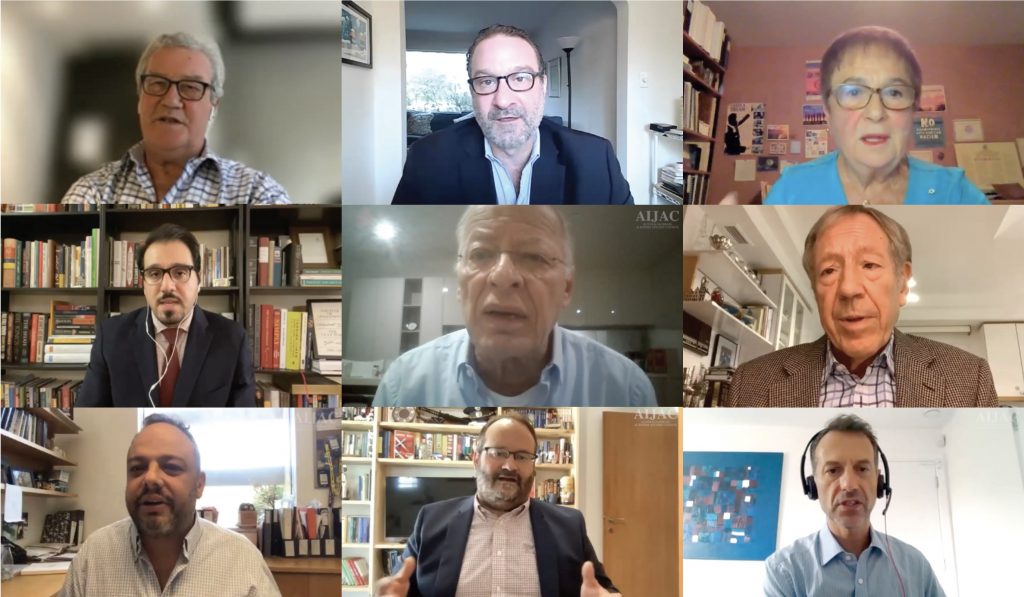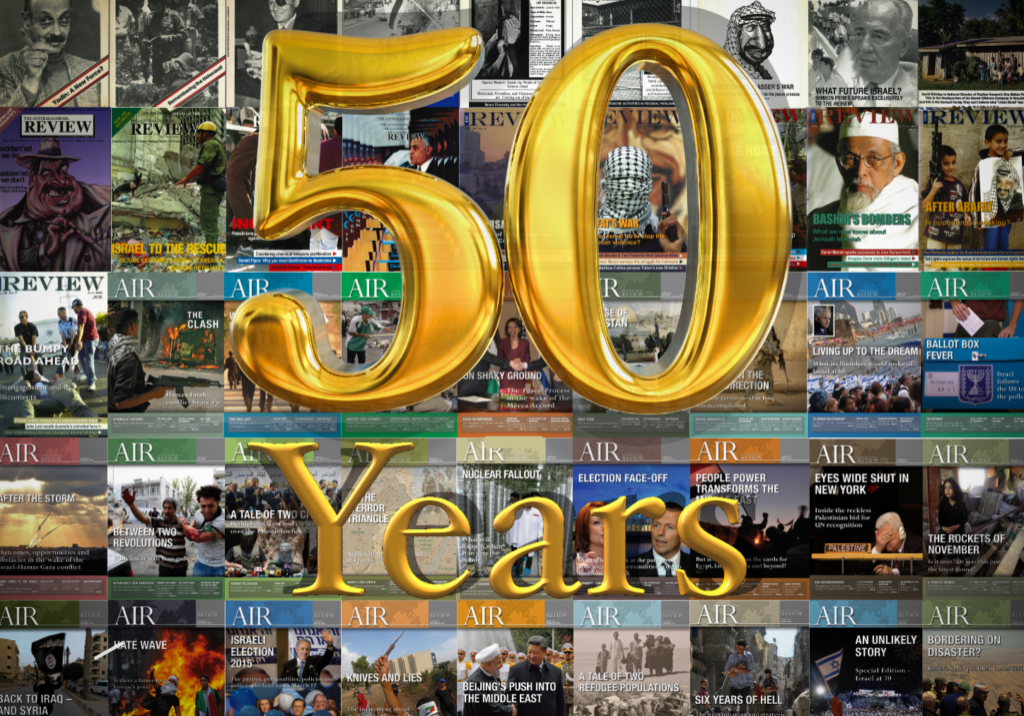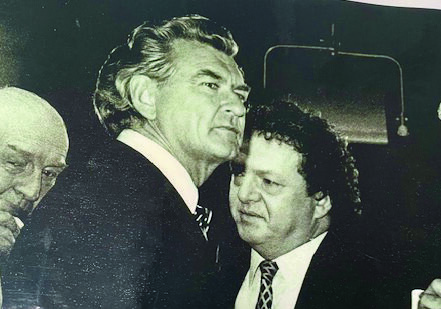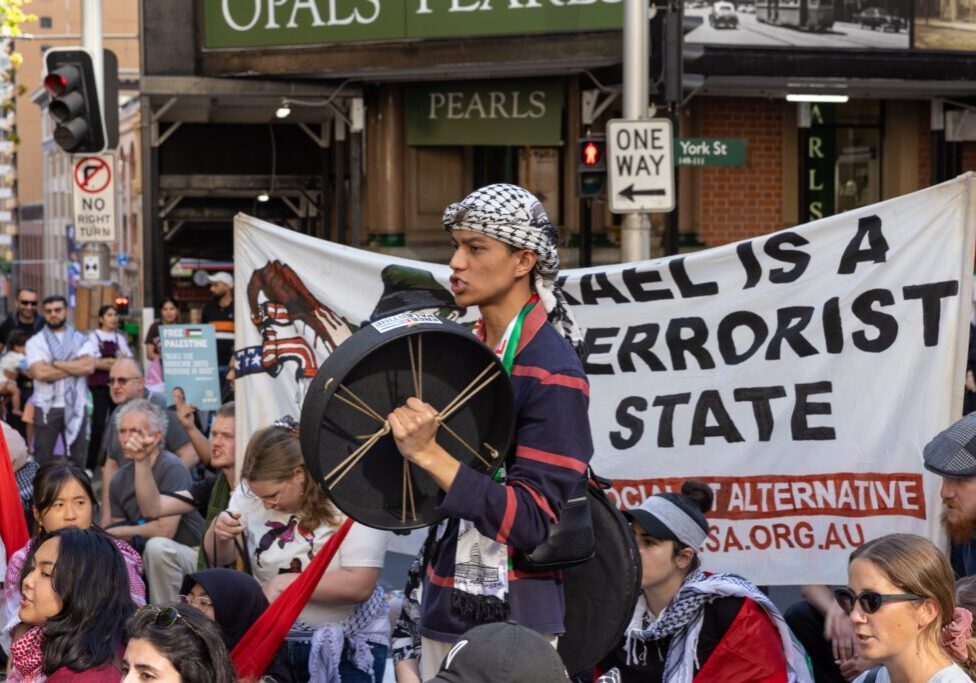Australia/Israel Review
More webinaring with AIJAC
Dec 15, 2021 | Jamie Hyams

AIJAC’s very successful webinar series continued through 2021, with numerous fascinating speakers providing a variety of important insights and perspectives on numerous different issues (For summaries of AIJAC’s earlier webinars, see the July 2020, Nov. 2020 and May 2021 editions of the AIR). Here is a summary of each of their presentations.
David Schenker – April 28
David Schenker, a Senior Fellow at the Washington Institute for Near East Policy and former high-ranking White House and Pentagon official discussed, “From Trump to Biden: Shifting Policies Towards the Middle East.” He outlined a number of apparent changes between the two administrations, the most obvious being the end of Trump’s maximum pressure campaign against Iran in favour of attempting to return to the JCPOA nuclear deal and on the Palestinian front, but also continuities. He noted Iran was pursuing its own maximum pressure campaign of violence against the US, and urged the US to retain sanctions as leverage to pursue a broader deal.
Ambassador Dore Gold – May 12
Dore Gold, President of the Jerusalem Center for Public Affairs and former Director-General of Israel’s Ministry of Foreign Affairs, gave an update on the situation in Israel two days after the Gaza conflict commenced. Of the violence in Jerusalem that Hamas used as a pretext for initiating the conflict, he said, “I have to say that the evidence that this is something that was incited and planned is overwhelming.” He said he believed Hamas initiated the violence to try to break down the Abraham Accords and damage improving relations between Israel’s Jews and Arabs.
Bassem Eid – June 1
Jerusalem-based political analyst and Palestinian human rights pioneer Bassem Eid set out the “Palestinian Case Against Hamas”. He said Gaza’s people want to get rid of Hamas, which always starts any violence between it and Israel. He stated, “In my opinion, the Hamas are…sacrificing their own people. We saw recently how the Hamas leaders hiding themselves in the tunnels, they have shelters to protect themselves. But the other two million civilians, they have no shelters…And Hamas is not care about his people. Hamas is much more care about their own political agenda, how to gain power, and how to gain riches.”
Ehud Yaari – June 8
Ehud Yaari, Israel’s leading Middle Eastern affairs commentator, spoke about “Israel’s Next Government – Domestic & International Challenges.” Yaari was sceptical about Israel’s then-new broad coalition Government. He said it was unprecedented that there were agreements between Yair Lapid’s Yesh Atid party and every other party, with the primary agreement between Yesh Atid and incoming PM Naftali Bennett’s Yamina party giving each of them a veto over any decisions. Overall, he described it as a complex puzzle with many contradictions to eject Binyamin Netanyahu from office. He also said that Hamas leaders were claiming victory in the Gaza conflict, but had suffered a severe blow.
Dr Emanuele Ottolenghi – June 29
Emanuele Ottolenghi, a senior fellow at the Washington-based Foundation for Defense of Democracies, addressed “Hezbollah and the Toxic Terror Crime Convergence.” He explained that Hezbollah is different to other terror groups that use crime to finance their activities, because its crime and terror had merged. Hezbollah, he said, is especially involved in the drug trade, but has also set up a global money-laundering network that services criminal syndicates. He added that its international criminal operators provide logistical support for its terrorists, and it has established criminal networks in many countries, including Australia.
Seth Frantzman – July 15
Jerusalem Post columnist and drone expert Seth Frantzman spoke about “Iran, Hamas and Hezbollah: The growing drone and rocket threats to Israel.” Israel, he said, leads the world in drone technology. He argued that Hamas had carefully planned and choreographed the May conflict, using it to test out Israel’s missile defences against barrage attack, and noted it had, for the first time, used a drone to attack Israel. However, Frantzman believes Iran exaggerates its advances in drone and missile technology, arguing if it really worked, Iran would keep it for attacks rather than continually showing it off.
Dave Rich – July 26
Dave Rich, Director of Policy at the UK Community Security Trust, and an expert on antisemitism, terrorism and extremism, discussed “Antisemitism in 2021”. He explained that modern antisemitism comes from the left, the right and radical Muslims. New forms, such as accusing Israel of being the same as the Nazis, mix with classical tropes. There was a huge escalation in antisemitic incidents during the Gaza conflict. COVID-19 also brought new strains of antisemitism – claims that COVID-19 is good because it kills Jews, conspiracy theories that Jews created the virus or perpetrated a hoax pandemic, and assertions that Israel is an equivalent to COVID-19.
Ehud Yaari – Aug. 6
Yaari’s next topic was “Gaza, COVID and Iran: The Key Challenges for Israel’s New Government.” Iran, he said, was not interested in reviving the JCPOA and was making many demands the US could not accept. At the same time, Iran was dropping its doctrine of strategic patience against Israel, and seeing how Israel reacted to attacks on its assets. He felt that the Biden Administration wasn’t likely to push for final status talks between Israel and the Palestinians, instead encouraging small-step agreements on matters such as security and economic cooperation. Meanwhile, tension between Turkey and Iran was causing Turkey to rethink its diplomatic strategy, he said.
Dr Michael Rubin – Aug. 20
Michael Rubin, resident scholar at the American Enterprise Institute and former Pentagon official, addressed “The Implications of the Afghanistan disaster.” He explained that, while the Afghan forces had been fighting the Taliban, the US provided air cover, intelligence and logistics, but despite the Afghans having been trained to work with that support, cut it off, knee-capping the Afghans on its way out. Meanwhile, Pakistan continued to provide the Taliban essential support. The withdrawal, he said, had empowered Islamists and US enemies. Together with previous actions, it had normalised US betrayal of allies, and showed no country should predicate its security on the word of the US, he said.
The Hon. Alexander Downer AC – Aug. 30
Australia’s longest-serving foreign minister, Alexander Downer spoke on “Australia’s Performance in a Challenging and Changing World.” He said the tension between Australia and China was all China’s doing, with Australia having done nothing wrong in protecting its national interests. China had tried to bully Australia to set an example, but learned Australia can be “pretty robust”. He is concerned that internal dynamics are weakening the US ability to be a “beacon to the world.” He argued Trump was right to have abandoned the nuclear deal with Iran, as it only helped Iran, and instead focus on the Abraham Accords.
Dr Tal Becker – Sept. 13
Tal Becker, the Australian-born Director of Legal Affairs for Israel’s Ministry of Foreign Affairs and a highly respected peace negotiator, discussed “One Year of the Abraham Accords: Their Impact and Future.” Becker himself was involved in drafting the Accords, which he said were the product of two decades of diplomacy, and driven by a variety of issues, not just a shared threat from Iran. It shouldn’t have been surprising the Arab countries didn’t put the Palestinian issue first, he said, because it is natural for countries with common interests to cooperate. Israel, he added, was making significant efforts to expand the Accords.
Prof. Irwin Cotler & Dr Karen Mock – Oct. 6
Former Canadian Attorney-General Irwin Cotler and fellow distinguished human rights advocate Karen Mock spoke on “The infamous 2001 Durban World Conference against Racism and the Ongoing Challenge of Antisemitism.” Mock described how antisemitism was rampant at the 2001 Durban Conference and its preparatory meetings. Cotler described the IHRA Working Definition of Antisemitism as “not only the most authoritative, but representative definition that we have” which is “anchored in human rights law, anchored in inequality rights law.” He added that, in contrast to Durban, it is “a blueprint for protecting human rights, for protecting equality rights, for protecting freedom of speech.”
Behnam Ben Taleblu – Oct. 26
Behnam Ben Taleblu, a senior fellow at the FDD, considered “Iran: Is There a Plan B?” He noted that currently the US is interested in de-escalation while Iran is interested in escalation, and Iran was responding to US tolerance of Iranian provocation with more violence, violations and nuclear advances. At an absolute minimum, he said, US steps should include censuring Iran at the International Atomic Energy Agency, working with its European partners to snap back sanctions on Iran, broadening the JCPOA and cracking down on Iran’s oil revenue. Otherwise there clearly is no Plan B as an alternative to hopes to resume the nuclear deal.
Moroccan Ambassador to Australia, His Excellency Karim Medrek – Nov. 4
Ambassador Karim Medrek spoke about “Morocco, Israel and the Jewish World: a new era of relations.” He said there had always been peaceful relations between Morocco’s Jewish and Muslim communities, and the Moroccan Jewish community has always been important. The Abraham Accords as they relate to Morocco shouldn’t be called normalisation, rather a consolidation of relations. He expects the improved relations will help bring prosperity for both Morocco and Israel, opening a real partnership for North Africa with the Indo-Pacific through the Middle East, and establishing a new paradigm for peace in the Middle East.
David Horovitz – Nov. 15
Founding editor of the Times of Israel David Horovitz’ topic was “Assessing the Bennett-Lapid Government and Prospects for 2022.” He called it the most implausible coalition in Israel’s history, but noted it had passed Israel’s first budget in three years, and said as long as Binyamin Netanyahu leads the opposition, it’s easier for the diverse coalition to stay together. He said it was too early to say whether relations between Israel’s Jewish and Arab communities would improve, and the Government’s main challenges will include the Iran nuclear issue and relations with the Palestinian Authority – describing PA President Abbas as “a very, very difficult partner.”
Dr Jonathan Schanzer – Nov. 24
Jonathan Schanzer, Senior Vice President for Research at the FDD, covered “Gaza Conflict 2021: Hamas, Israel and Eleven Days of War”, having just written a book on the topic. He said he had watched Israeli, Arabic and Western television coverage of the war, and it was as if the Western media was covering a different conflict, often being more anti-Israel than even the Arabic media. Lessons the media should learn from the war include not to ignore the internal Palestinian dynamics that often contribute to wars with Israel and not to ignore Israeli coverage. To avoid Hamas starting another war, he said, don’t enter another nuclear deal with Iran, because that will just give Iran money to pass on to Hamas.
Recordings of and excerpts from all these webinars are available on AIJAC’s website, YouTube channel and Facebook page.
Tags: AIJAC





